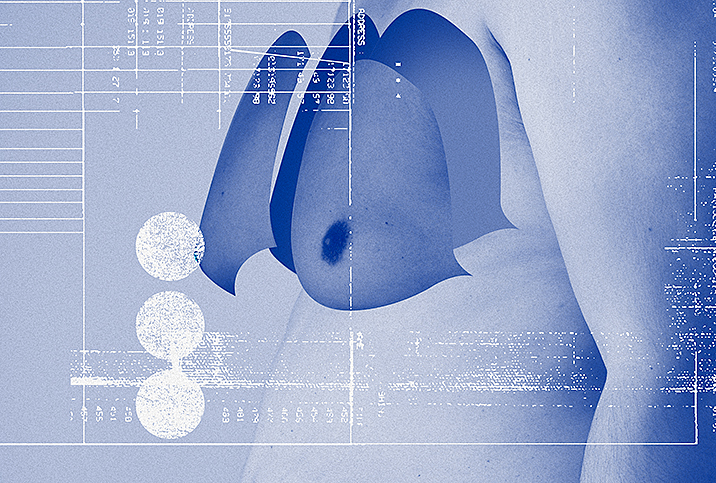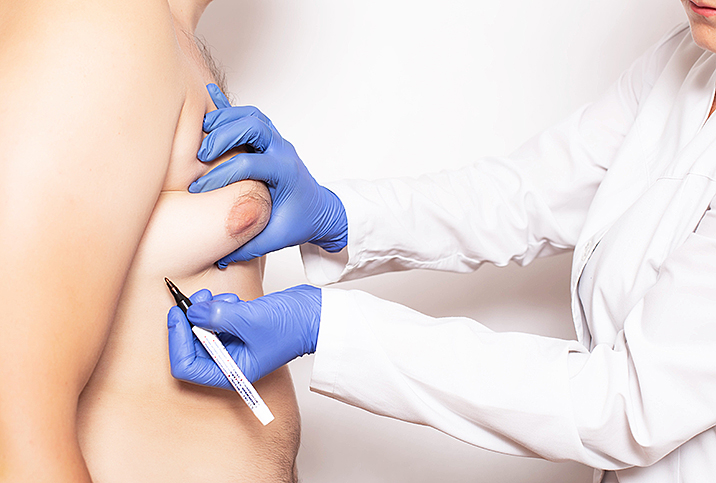Does Gynecomastia Cause Erectile Dysfunction?

Male breast development, also known as gynecomastia, is a relatively rare and non-life-threatening condition, but it can cause lasting psychological problems. Essentially, gynecomastia is an increase in glandular breast tissue in boys and men that can affect one or both breasts.
A common cause is an imbalance between estrogen and testosterone where an insufficient amount of the latter hormone is produced and the ratio is disrupted. This may lead to erectile dysfunction (ED) due to the decreased levels of testosterone, and a lower sex drive because a man may be self-conscious or embarrassed about the way his body looks.
Gynecomastia is sometimes associated with the use of drugs or alcohol and certain health conditions, but it is most commonly seen in boys in mid-puberty and then again in older men as hormones change.
Gynecomastia is a hormonal condition rather than simple fat deposits occurring in overweight men, known as lipomastia. Whether because of hormones or psychological issues, studies have shown a link between gynecomastia and sexual dysfunction, such as ED. Luckily, you can tackle both issues to return to a better quality of life.
So does gynecomastia cause erectile dysfunction? It's not that simple.
Time for a checkup
You likely won't find any relief from your gynecomastia and any related ED by just hitting the internet. You should consult with the doctor, who will help you better understand the root cause of your increased breast tissue and what you can do about it.
Your doctor may require an ultrasound or mammogram to find out whether the tissue is glandular or fat. Blood tests will measure hormone levels and imbalances and let you know if you are experiencing low testosterone (also known as low-T). Gynecomastia and low-T go hand in hand—low-T and erectile dysfunction sometimes do, too. Perhaps a silver lining of this vicious cycle is that the same remedies might have a positive effect on all three conditions.
You should also get checked for underlying health issues such as hypothyroidism, liver and kidney issues and andropause (also known as male menopause), which is often associated with lower testosterone levels and sexual health issues. Men with gynecomastia who are undergoing anti-androgen therapy as part of prostate cancer treatment may benefit from pretreatment radiation.
Gynecomastia as a side effect of medication
When you visit the doctor, you should also discuss the medications you are taking because some may be the cause of your gynecomastia. Ketoconazole (used to treat fungal infections), spironolactone (a blood pressure medication) and cimetidine (often prescribed for stomach ulcers) can all cause gynecomastia in some patients, as can certain prostate cancer treatments. Talk with your doctor about switching to alternative drugs, which might help resolve your breast tissue increase.
And it's not just prescription medications to watch out for, either. Certain herbal remedies such as tea tree oil and lavender, both found in soap and lotions, may mimic the actions of estrogen, leading to gynecomastia. Check the ingredient list of your grooming products and switch if necessary.
What you can do about gynecomastia and ED
If changing certain medications does not resolve your gynecomastia, other treatments involve boosting your testosterone levels. If a blood test reveals a testosterone deficiency, your physician may recommend testosterone replacement therapy (TRT) in the form of injections or skin topicals. Other ways to boost testosterone production include increasing exercise, losing weight and stopping steroid use. Also, your doctor may opt for a short course of certain drugs that block the effects of excess estrogen.
If your gynecomastia can't be resolved with changes in lifestyle and prescription medications, or through therapy, you can consider surgical options. Surgical removal of glandular tissue or liposuction may result in a more masculine aesthetic and help you tackle the psychological causes of your gynecomastia-related ED and improve your sex life.
Don't let changes in the appearance of your chest reduce your quality of life or damage your relationship with your partner. The first step is to consult your doctor to determine the cause. You might find that changing your lifestyle, increasing testosterone levels, switching medications and discontinuing the use of certain herbal substances resolve your gynecomastia, improve your ED and generally contribute to a sense of well-being all at the same time.


















